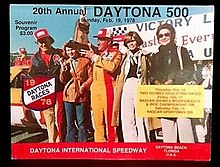The 1976 NASCAR Grand National Winston Cup Series was the 28th season of professional stock car racing in the United States, the 5th modern era season of the Grand National series and sixth under R. J. Reynolds sponsorship through its Winston cigarette brand. The season began on Sunday, January 18 and ended on Sunday, November 21. Cale Yarborough, driving the #11 Junior Johnson Holly Farms Chevrolet scored his first of three consecutive NASCAR Grand National Series Winston Cup Championships. Skip Manning was named NASCAR Rookie of the Year.
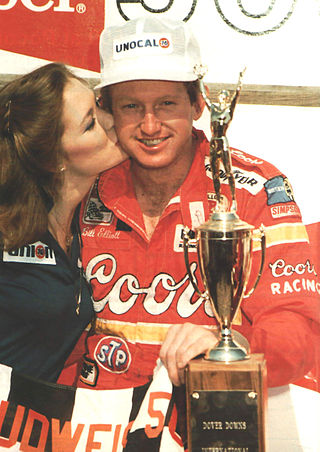
The 1988 NASCAR Winston Cup Series was the 40th season of professional stock car racing in the United States and the 17th modern-era Cup series. The season began on February 7 at Daytona International Speedway and ended on November 20 at the Atlanta International Speedway. Bill Elliott of Melling Racing won the championship.
The 1986 NASCAR Winston Cup Series was the 38th season of professional stock car racing in the United States and the 15th modern-era Cup series season. The season began on February 16 and ended November 16. Dale Earnhardt of RCR Enterprises won his second championship this year.
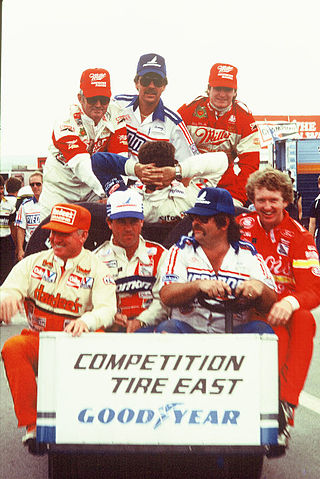
The 1985 NASCAR Winston Cup Series was the 37th season of professional stock car racing in the United States and the 14th modern-era Cup series season. The season began on Sunday, February 10 and ended on Sunday, November 17. Darrell Waltrip, driving for Junior Johnson, was crowned champion at the end of the season. Bill Elliott, driving for Harry Melling, had won 11 races in 1985, but lost the title by 101 points to three-time race winner Waltrip. This was the first season where all races were televised in some form.
The 1984 NASCAR Winston Cup Series was the 36th season of professional stock car racing in the United States and the 13th modern-era Cup series season. It began on Sunday, February 19 and ended on Sunday, November 18. Terry Labonte was crowned champion at the end of the season. This was the final year for Chrysler until Dodge returned in 2001.
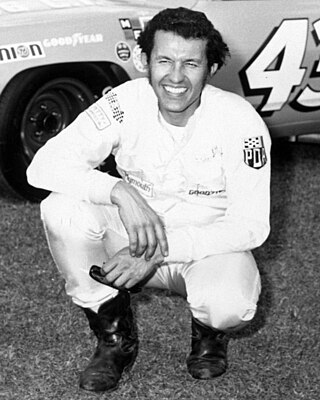
The 1974 NASCAR Winston Cup Series was the 26th season of professional stock car racing in the United States and the 3rd modern-era NASCAR Cup series. The season began on Sunday January 20 and ended on Sunday November 24. The first 15 races were shortened 10 percent due to the 1973 oil crisis. Following criticism of the 1972 and 1973 points systems that placed emphasis on completed miles, NASCAR implemented a new points system, that took basic purse winnings, multiplied by number of starts, and divided by 1,000; it was designed to more directly reward winning races, a response to Benny Parsons' championship the previous year with just one win. Richard Petty was Winston Cup champion at the end of the season finishing 567.45 points ahead of Cale Yarborough, while David Pearson finished a strong third in points despite only nineteen starts. Earl Ross was named NASCAR Rookie of the Year.

The 1979 Daytona 500, the 21st annual running of the event, was the second race of the 1979 NASCAR Winston Cup Series season. It was held on February 18, 1979 at Daytona International Speedway, in Daytona Beach, Florida. It has been called the most important race in stock car history.
The 1977 NASCAR Grand National Winston Cup Series was the 29th season of professional stock car racing in the United States and the 6th modern era NASCAR Cup series. The season began on Sunday, January 16 and ended on Sunday, November 20. Cale Yarborough driving the Junior Johnson #11 Holly Farms Chevrolet won his second consecutive NASCAR Grand National Series Winston Cup Championship. Ricky Rudd was crowned NASCAR Rookie of the Year.
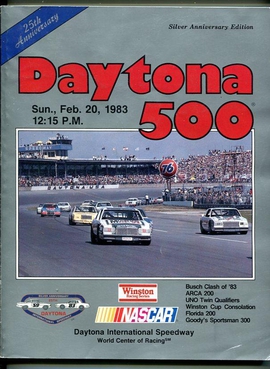
The 1983 Daytona 500, the 25th running of the event, was held February 20 at Daytona International Speedway in Daytona Beach, Florida as the first race of the 1983 NASCAR Winston Cup season.

The 1979 NASCAR Winston Cup Series was the 31st season of professional stock car racing in the United States and the 8th modern-era Cup series. It began on Sunday, January 14, and ended on Sunday, November 18. Richard Petty won his seventh and final Winston Cup championship, winning by 11 points over Darrell Waltrip. Dale Earnhardt was crowned NASCAR Rookie of the Year.

The 1977 Daytona 500, the 19th running of the event, was held on February 20, 1977, as the second race of the 1977 NASCAR Winston Cup Series Season.
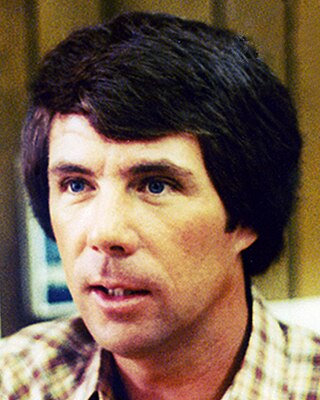
The 1981 NASCAR Winston Cup Series was the thirty-third season of professional stock car racing in the United States and the 10th modern-era Cup Season. It was the first year of the Gen 3 car. Because of the energy crisis, manufacturers were downsizing their cars to be more fuel-efficient, which NASCAR reflected by mandating a 110-inch wheelbase that still exists today. The season began at Riverside International Raceway with the first Winston Western 500 on January 11, 1981 and ended with the same event on November 22. Darrell Waltrip won his first championship with point margin of fifty-three points over Bobby Allison. Ron Bouchard was named Rookie of the Year.
The 1973 NASCAR Winston Cup Series was the 25th season of professional stock car racing in the United States and the 2nd modern-era Cup season. The season began on Sunday January 21 and ended on Sunday October 21. 31 races were scheduled in the 1973 season. 28 were held.

The 1975 NASCAR Grand National Winston Cup Series was the 27th season of professional stock car racing in the United States and the 4th season in the modern era of the NASCAR Cup series. The season began on Sunday, January 19 and ended on Sunday, November 12. Richard Petty, driving the #43 Petty Enterprises STP Dodge scored his sixth NASCAR Grand National Series Winston Cup Championship. Bruce Hill was named NASCAR Rookie of the Year. NASCAR introduced a new points system for 1975, a system designed by statistician Bob Latford. For the first time, each race on the NASCAR Winston Cup Grand National schedule carried an equal point value, a system that would be used for 36 seasons, from 1975 to 2010, with modifications in 2004 and 2007 each time by increasing the emphasis for a win in adding five additional points each time for a race winner. The original points system ran for the first 29 seasons, from 1975 to 2003.

The 1980 NASCAR Winston Cup Series was the 32nd season of professional stock car racing in the United States and the 9th modern-era NASCAR Cup season. It was the final year with the Gen 2 car. The season began on Sunday, January 13 and ended on Sunday, November 15. Dale Earnhardt won his first Winston Cup championship, winning by 19 points over Cale Yarborough. Jody Ridley was crowned NASCAR Rookie of the Year.

The 1974 National 500 was a NASCAR Winston Cup Series racing event that took place on October 6, 1974, at Charlotte Motor Speedway in Concord, North Carolina.
The 1978 NASCAR Grand National Winston Cup Series was the 30th season of professional stock car racing in the United States and the 7th modern era NASCAR Cup series. The season began on Sunday, January 22 and ended on Sunday, November 19. Cale Yarborough driving the Junior Johnson #11 First National City Travelers Checks Oldsmobile won his then record third consecutive NASCAR Grand National Winston Cup Winston Cup. Ronnie Thomas was crowned NASCAR Rookie of the Year in a tight battle with Roger Hamby.
This article documents historical records, statistics, and race recaps of the Daytona 500, held annually at Daytona International Speedway in Daytona Beach, Florida.

The 1979 Northwestern Bank 400 was a NASCAR Winston Cup Series race that took place on March 25, 1979, at North Wilkesboro Speedway in North Wilkesboro, North Carolina.

The 1975 Winston 500 was an automobile race at the Alabama International Motor Speedway on May 4, 1975.
